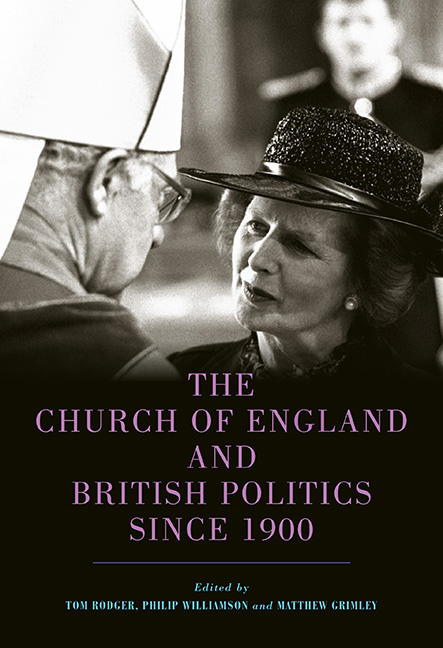Book contents
- Frontmatter
- Contents
- Notes on contributors
- Preface
- Abbreviations and locations of principal collections
- Introduction: the Church of England, the British state and British politics during the twentieth century
- 1 The politics of Church defence: Archbishop Davidson, the national church and the ‘national interest’, c. 1900–14
- 2 Archbishops and the monarchy: leadership in British religion, 1900–2012
- 3 Ecclesiastical conservatism: Hensley Henson and Lord Hugh Cecil on Church, state and nation, c. 1900–40
- 4 Hensley Henson, the prayer book controversy and the conservative case for disestablishment
- 5 Assembling an Anglican view of self-governing sexual citizenship, 1918–45
- 6 Politics in the parish: Joseph Needham at Thaxted, c. 1925–85
- 7 Anglicans, reconstruction and democracy: the Cripps circle, 1939–52
- 8 Parliament and the law of the Church of England, 1943–74
- 9 The Church of England and religious education during the twentieth century 199
- 10 Spiritual authority in a ‘secular age’: the Lords Spiritual, c. 1950–80
- 11 ‘A sort of official duty to reconcile’: Archbishop Fisher, the Church of England and the politics of British decolonization in East and Central Africa
- 12 A ‘baffling task’: Archbishop Fisher and the Suez Crisis
- 13 John Collins, Martin Luther King, Jr, and transnational networks of protest and resistance in the Church of England during the 1960s
- 14 The Church of England, minority religions and the making of communal pluralism
- Index
- STUDIES IN MODERN BRITISH RELIGIOUS HISTORY
5 - Assembling an Anglican view of self-governing sexual citizenship, 1918–45
Published online by Cambridge University Press: 28 April 2020
- Frontmatter
- Contents
- Notes on contributors
- Preface
- Abbreviations and locations of principal collections
- Introduction: the Church of England, the British state and British politics during the twentieth century
- 1 The politics of Church defence: Archbishop Davidson, the national church and the ‘national interest’, c. 1900–14
- 2 Archbishops and the monarchy: leadership in British religion, 1900–2012
- 3 Ecclesiastical conservatism: Hensley Henson and Lord Hugh Cecil on Church, state and nation, c. 1900–40
- 4 Hensley Henson, the prayer book controversy and the conservative case for disestablishment
- 5 Assembling an Anglican view of self-governing sexual citizenship, 1918–45
- 6 Politics in the parish: Joseph Needham at Thaxted, c. 1925–85
- 7 Anglicans, reconstruction and democracy: the Cripps circle, 1939–52
- 8 Parliament and the law of the Church of England, 1943–74
- 9 The Church of England and religious education during the twentieth century 199
- 10 Spiritual authority in a ‘secular age’: the Lords Spiritual, c. 1950–80
- 11 ‘A sort of official duty to reconcile’: Archbishop Fisher, the Church of England and the politics of British decolonization in East and Central Africa
- 12 A ‘baffling task’: Archbishop Fisher and the Suez Crisis
- 13 John Collins, Martin Luther King, Jr, and transnational networks of protest and resistance in the Church of England during the 1960s
- 14 The Church of England, minority religions and the making of communal pluralism
- Index
- STUDIES IN MODERN BRITISH RELIGIOUS HISTORY
Summary
Histories of modern Britain have long assumed a simplistic connection between the rise of new ideas about sex and sexuality and the decline of Christian religion. According to this interpretation, traditional Christian teaching towards sexual issues was repressive, ignorant and backward-looking. Christian thought, it was assumed, was antithetical to the greater knowledge about sex and the growing freedom of sexual self-expression that gradually gained ground during the nineteenth and twentieth centuries. Modern attitudes towards sexuality tend to be associated with notions of greater individualism, the privatization of moral decision-making and increasing sexual self-governance – ideas that are most closely associated with the permissive reforms of the late 1960s on homosexual acts, abortion, divorce and the availability of contraception. Historical and popular convention has it that secular thinking was responsible for the main advances in modern attitudes towards sexual behaviour, and that the efforts of Christian commentators to revise their own sexual ethics in the 1950s and 1960s were a late, desperate attempt to keep pace with shifts in secular opinion. These long-accepted assumptions have recently been challenged. Scholars have revealed progressive Christian approaches towards sexual issues, driven both by enthusiastic individuals and by mainstream Christian (often Anglican-led) organizations, concentrating in particular on the 1950s and 1960s. These contributions act as a welcome corrective to the pre-conceived accounts. However, their limited chronological scope has served to focus attention ever more tightly on the century's middle decades. By considering a longer chronology, this essay will demonstrate that the origins of the progressive attitudes on sexual issues which became prominent in the 1950s and 1960s can be located in the inter-war period. These years tend to be characterized as ones of coercive intervention, moral regulation and repression by the British state and by voluntary social purity agencies. State policy was to regulate activities deemed ‘immoral’ and contrary to the public good but to ignore, as outside its purview, heterosexual acts carried out by consenting adults in private. This led to a plethora of legislation on sexual issues deemed to have the capacity to corrupt and deprave society, especially its young and vulnerable members, including laws against obscene publications (including serious scientific and literary works), against press reporting of certain details in divorce cases and against male homosexual behaviour (including private acts by consenting adults).
- Type
- Chapter
- Information
- The Church of England and British Politics since 1900 , pp. 120 - 139Publisher: Boydell & BrewerPrint publication year: 2020

